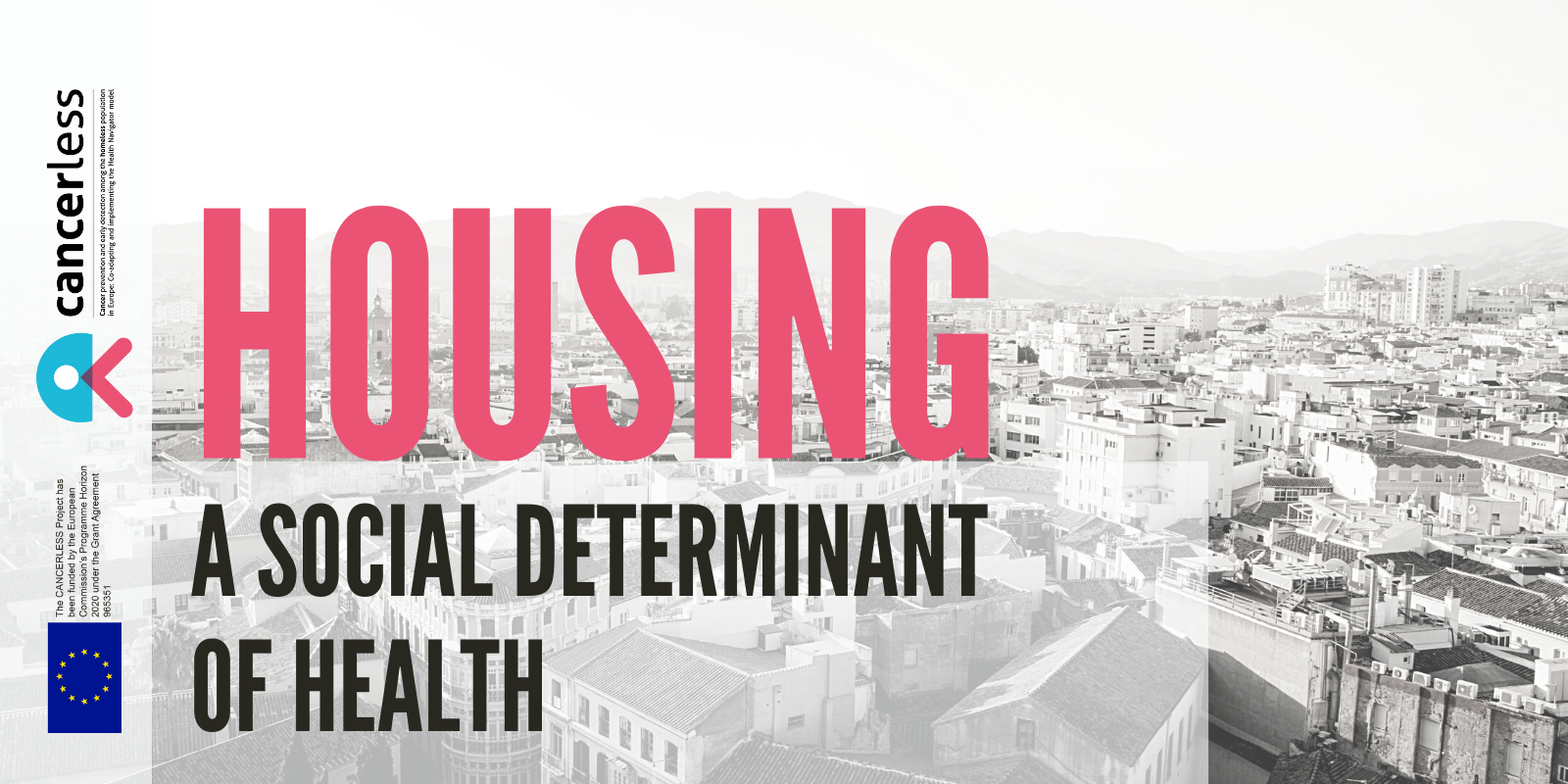‘Social Determinants of Health’ are non-medical factors, well based and evidenced, intertwining the material circumstances of people, their socio-economic position and the socio-cultural environment as key mediators in their health status. These factors have a great impact on the access to healthcare and long-life prognosis and health trajectories of individuals.
Currently, theWHO distinguishes 5 dimensions of social determinants of health: economic stability, education access and quality, social and community context, housing and basic amenities and the environment and healthcare access and quality.
See WHO’s factsheets on Environmental Health Inequalities
Considering the role of socioeconomic position and built environment in health, housing – from inappropriate, precarious housing and house insecurity to homelessness or rough sleeping – is one of the most important determinants.
💭 Did you know that cancer is the second most common cause of death among the homeless population?
The cancer mortality rate is 2⃣x that of the general population in high-income countries.#worldcancerday #healthinequality pic.twitter.com/g2ySkGT76Z
— FEANTSA (@FEANTSA) February 4, 2022
In this context, it seems crucial to highlight that people experiencing homelessness are an especially vulnerable group. Sleeping rough or staying in temporary or emergency accommodation affects people greatly, making them a medically high-risk population disproportionately affected by poor health and disability. Furthermore, people experiencing homelessness face multiple barriers to accessing healthcare as well as public health information.
At the same time, cancer is a leading cause of death worldwide: 10 million people died in 2020 because of to cancer, nearly one in six deaths . Cancer mortality is two times higher among people experiencing homelessness, compared to the general adult population in high-income countries.
📢 @FEANTSA and the @CANCERLESS_EU consortium call on the @EU_Commission to make ‘housing situation’ one of the inequality dimensions of the EU Cancer Registry.
Read this thread to find out why⬇️#EUCancerPlan #homelessness #healthinequalities pic.twitter.com/HJxYNH9gQN
— FEANTSA (@FEANTSA) February 16, 2022
The situation of deprivation and the lack of access to primary and secondary care and prevention, jointly with the fragmentation and difficulties in navigating the healthcare system, contribute to harshening this gap.
In our blog, we published different posts related to the intersectional aspects related to cancer and, in general, health: masculinities , women affected by homelessness or the very particular situation of migrants .
🔴 Although racial discrimination when accessing housing is prohibited, it continues to be a reality.
⬇️ Read our thread for the International Day for the Elimination of Racial Discrimination to find out more! #FightRacismhttps://t.co/nK4lL5h6Im
— FEANTSA (@FEANTSA) March 23, 2022
“How can we extend the pandemic’s public health intervention, that improved conditions for many homeless people, to make real sustainable social progress?”
🔖 Read our recommendations for improving the way we address homelessness after the pandemic: https://t.co/alO7Q0ABox https://t.co/PWWON67md3
— FEANTSA (@FEANTSA) January 31, 2022
In February, FEANTSA, jointly with the CANCERLESS consortium sent a letter to the European Commission calling for including “housing” as a crucial determinant of health within the EU health policies and the EU Cancer Plan.
The complete letter can be consulted here (English and Greek languages)
@NicolasSchmitEU closes 2nd conference #PFEU on European Platform for Combatting #homelessness in @grandlyon. He leaves us in no doubt that #homelessness is now firmly on the EU agenda! @FEANTSA‘s thanks & congratulations for putting it there! A lot of work ahead! pic.twitter.com/WgGfxxRL9h
— Ruth Schofield Owen (@RuthSOwen1) March 1, 2022

